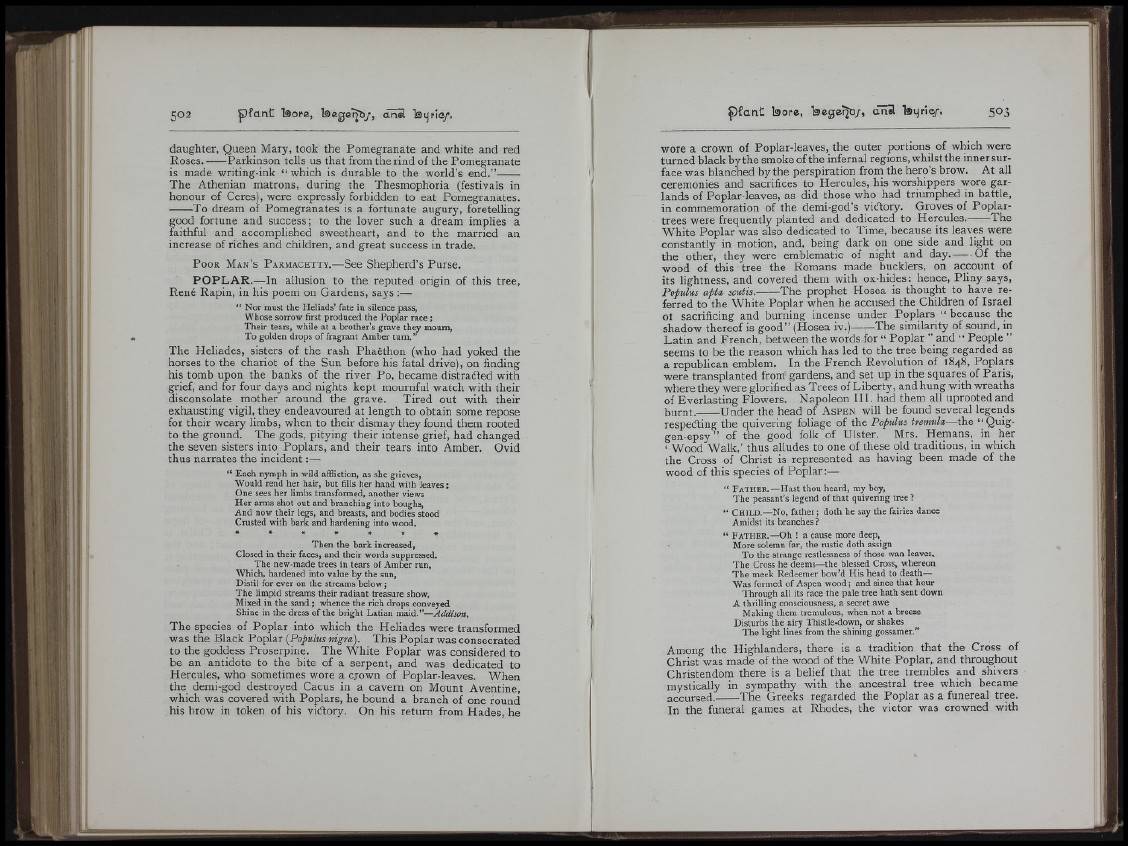
I-Í 4'ILI
b I I
daughter, Queen Mary, took the Pomegranate and white and red
Roses. Parkinson tells us that from the rind of the Pomegranate
is made writing-ink “ which is durable to the world’s end.” ------
The Athenian matrons, during the Thesmophoria (festivals in
honour of Ceres), were expressly forbidden to eat Pomegranates.
To dream of Pomegranates is a fortunate augury, foretelling
good fortune and success; to the lover such a dream implies a
faithful and accomplished sweetheart, and to the married an
increase of riches and children, and great success in trade.
P oor M a n ’ s P a r m a c e t t y .—See Shepherd’s Purse.
P O P L A R .—In allusion to the reputed origin of this tree,
René Rapin, in his poem on Gardens, says :—
“ Nor must the Heliads’ fate in silence pass.
Whose sorrow first produced the Poplar ra c e ;
Their tears, while at a brother’s grave they mourn.
To golden drops of fragrant Amter turn.”
The Heliades, sisters of the rash Phaethon (who had yoked the
horses to the chariot of the Sun before his fatal drive), on finding
his tomb upon the banks of the river Po, became distraéted with
grief, and for four days and nights kept mournful watch with their
disconsolate mother around the grave. Tired out with their
exhausting vigil, they endeavoured at length to obtain some repose
for their weary limbs, when to their dismay they found them rooted
to the ground. The gods, pitying their intense grief, had changed
the seven sisters into Poplars, and their tears into Amber. Cvid
thus narrates the incident:—
“ Each nymph in wild affliction, as she grieves,
Would rend her hair, but fills her hand with le av e s;
One sees her limbs transformed, another views
Her arms shot out and branching into boughs,
And now their legs, and breasts, and bodies stood
Crusted with bark and hardening into wood,
* * * * * * *
Then the bark increased,
Closed in their faces, and their words suppressed.
The new-made trees in tears of Amber run,
Which, hardened into value by the sun,
Distil for ever on the streams below;
The limpid streams their radiant treasure show,
Mixed in the sand ; whence the rich drops conveyed
Shine in the dress of the bright Latian maid.”—A d d iso n .
The species of Poplar into which the Heliades were transformed
was the Black Poplar {Populus nigra). This Poplar was consecrated
to the goddess Proserpine. The White Poplar was considered to
be an antidote to the bite of a serpent, and was dedicated to
Hercules, who sometimes wore a crown of Poplar-leaves. When
the demi-god destroyed Cacus in a cavern on Mount Aventine,
which was covered with Poplars, he bound a branch of one round
his brow in token of his viétory. On his return from Hades, he
50 3
wore a crown of Poplar-leaves, the outer portions of which were
turned black by the smoke of the infernal regions, whilst the inner surface
was blanched by the perspiration from the hero’s brow. At all
ceremonies and sacrifices to Hercules, his worshippers wore garlands
of Poplar-leaves, as did those who had triumphed in battle,
in commemoration of the demi-god’s vi(itory. Groves of Poplartrees
were frequently planted and dedicated to Hercules. The
White Poplar was also dedicated to Time, because its leaves were
constantly in motion, and, being dark on one side and light on
the other, they were emblematic of night and day. Of the
wood of this tree the Romans made bucklers, on account of
its lightness, and covered them with ox-hides: hence, Pliny says,
Populus apta scutis. The prophet Hosea is thought to have referred
to the White Poplar when he accused the Children of Israel
ot sacrificing and burning incense under Poplars “ because the
shadow thereof is good” (Hosea iv.)——The similarity of sound, in
Latin and French, between the words for “ Poplar ” and “ People ”
seems to be the reason which has led to the tree being regarded as
a republican emblem. In the French Revolution of 1848, Poplars
were transplanted from gardens, and set up in the squares of Paris,
where they were glorified as Trees of Liberty, and hung with wreaths
of Everlasting Flowers. Napoleon HI. had them all uprooted and
burnt. Under the head of A s p e n will be found several legends
respedling the quivering foliage of the Populus tremula—the “ Quig-
gen-epsy” of the good folk of Ulster. Mrs. Hemans, in her
‘ Wood Walk,’ thus alludes to one of these old traditions, in which
the Cross of Christ is represented as having been made of the
wood of this species of Poplar:—
“ F a t h e r .— Hast thou heard, my boy,
The peasant’s legend of that quivering tree ?
“ C h i l d .—No, father; doth he say the fairies dance
Amidst its branches ?
“ F a t h e r .—Oh ! a cause more deep,
More solemn far, the rustic doth assign
To the strange restlessness of those wan leaves.
The Cross he deems—the blessed Cross, whereon
The meek Redeemer bow’d His head to death—
Was formed of Aspen wood; and since that hour
Through all its race the pale tree hath sent down
A thrilling consciousness, a secret awe
Making them tremulous, when not a breeze
Disturbs the airy Thistle-down, or shakes
The light lines from the shining gossamer.’*
Among the Highlanders, there is, a tradition that the Cross of
Christ was made of the wood of the White Poplar, and throughout
Christendom there is a belief that the tree trembles and shivers
mystically in sympathy with the ancestral tree which became
accursed. The Greeks regarded the Poplar as a funereal tree.
In the funeral games at Rhodes, the victor was crowned with
' 'I
4' rill